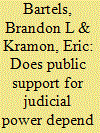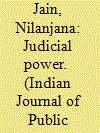| Srl | Item |
| 1 |
ID:
171340


|
|
|
|
|
| Summary/Abstract |
Judicial power is central to democratic consolidation and the rule of law. Public support is critical for establishing and protecting it. Conventional wisdom holds that this support is rooted in apolitical factors and not dependent on who is in political power. By contrast, we argue that support may be driven by instrumental partisan motivations and therefore linked to partisan alignment with the executive. We test the argument with survey evidence from 34 African countries. To provide causal evidence, we conduct difference-in-differences analyses leveraging Ghana’s three presidential transitions since 2000. Across Africa, support for judicial power is high, while trust in courts is lower. However, presidential co-partisans are less supportive of horizontal judicial power over the president and more supportive of vertical power over the people. The article demonstrates the importance of partisan alignment with the executive in shaping support for judicial power, with implications for judicial behavior and legitimacy.
|
|
|
|
|
|
|
|
|
|
|
|
|
|
|
|
| 2 |
ID:
099144


|
|
|
| 3 |
ID:
106253


|
|
|
|
|
| Publication |
2011.
|
| Summary/Abstract |
Although scholars have made considerable progress on a number of important research questions by relaxing assumptions commonly used to divide political science into subfields, rigid boundaries remain in some contexts. In this essay, we suggest that the assumption that international politics is characterized by anarchy whereas domestic politics is characterized by hierarchy continues to divide research on the conditions under which governments are constrained by courts, international or domestic. We contend that we will learn more about the process by which courts constrain governments, and do so more quickly, if we relax the assumption and recognize the substantial similarities between domestic and international research on this topic. We review four recent books that highlight contemporary theories of the extent to which domestic and international law binds states, and discuss whether a rigid boundary between international and domestic scholarship can be sustained on either theoretical or empirical grounds.
|
|
|
|
|
|
|
|
|
|
|
|
|
|
|
|
| 4 |
ID:
156840


|
|
|
|
|
| Summary/Abstract |
It is widely assumed that the Supreme Court of the United States has established supremacy over contested constitutional questions, with the power to make final determinations of constitutional meaning. Since the 1960s, most scholars have assumed that legislatures and courts are engaged in a power struggle in which countermajoritarian courts can assert their will over majoritarian legislatures. More recently, a new generation of scholarship has demonstrated that judicial power often expands as a result of the willful empowerment of the judiciary by actors in other branches. Most scholars working with the latter framework, however, do not dispute that the United States has a regime of judicial supremacy—they simply see the political empowerment of courts as an explanation for why judicial supremacy has emerged despite the initially weak position of the judiciary. I argue that the insights of the political empowerment literature should be pressed further. It makes little sense to use the general label “judicial supremacy” for a system in which judicial power remains dependent on choices made by other political actors. Examining several cases that are generally seen as canonical examples of assertions of judicial supremacy, I find that courts were unable to settle constitutional debates, and in addition often either were unable to achieve their policy aims or did not actually require other political actors to do anything. The logic of new empirical findings about the sources of judicial power should compel scholars to question whether aggressive assertions of supremacy in judicial opinions are in fact accurate descriptions of how judicial power functions in the United States.
|
|
|
|
|
|
|
|
|
|
|
|
|
|
|
|
| 5 |
ID:
161746


|
|
|
|
|
| Summary/Abstract |
Courts routinely resolve factual disputes as an adjunct to settling legal controversies, and such fact-finding frequently involves scientific and technical evidence. It is important to ask what intellectual resources judges bring to this task. Instead of assessing how much science judges know or understand, this essay focuses on the judge's role in articulating and reinforcing prevailing cultural attitudes toward science. Background judicial assumptions matter at three significant junctures. First, judges maintain the lay-expert boundary by deciding whether an issue demands expert testimony at all. Second, judges act as epistemological gatekeepers, by determining which expert claims and ways of reasoning are entitled to deference and which are not. Third, judges decide how to classify and categorize things of uncertain ontological status as a prelude to applying legal rules. Each kind of decision offers a window into judicial common sense, a relatively neglected topic in studies of law and science.
|
|
|
|
|
|
|
|
|
|
|
|
|
|
|
|